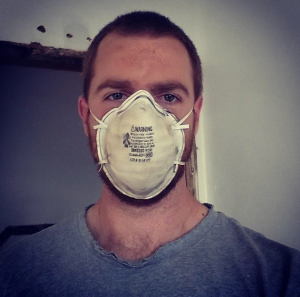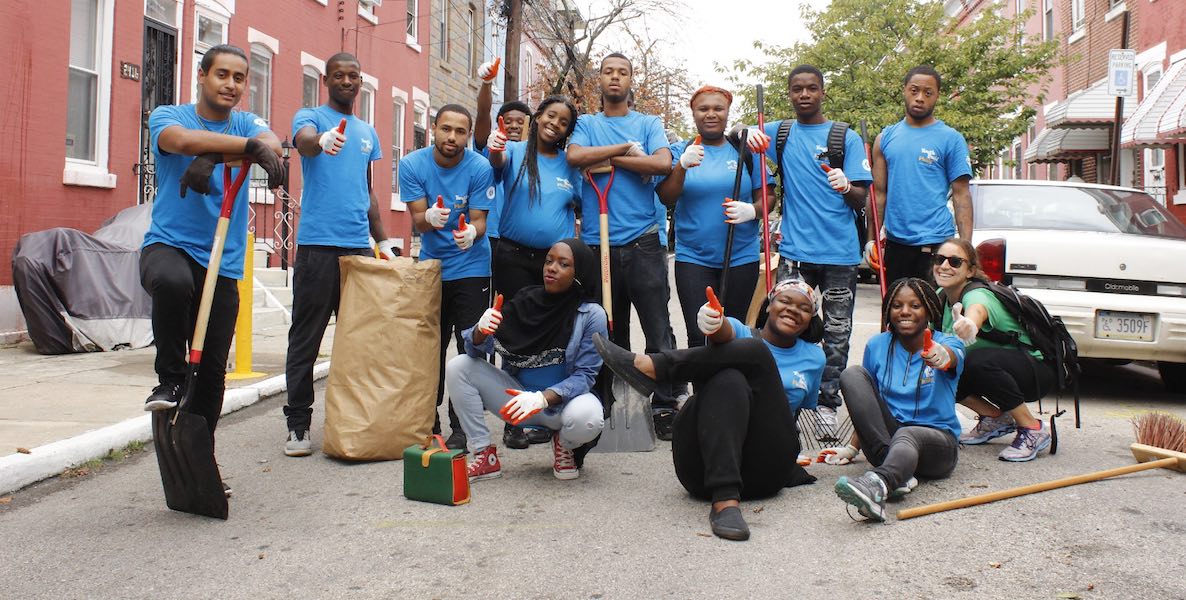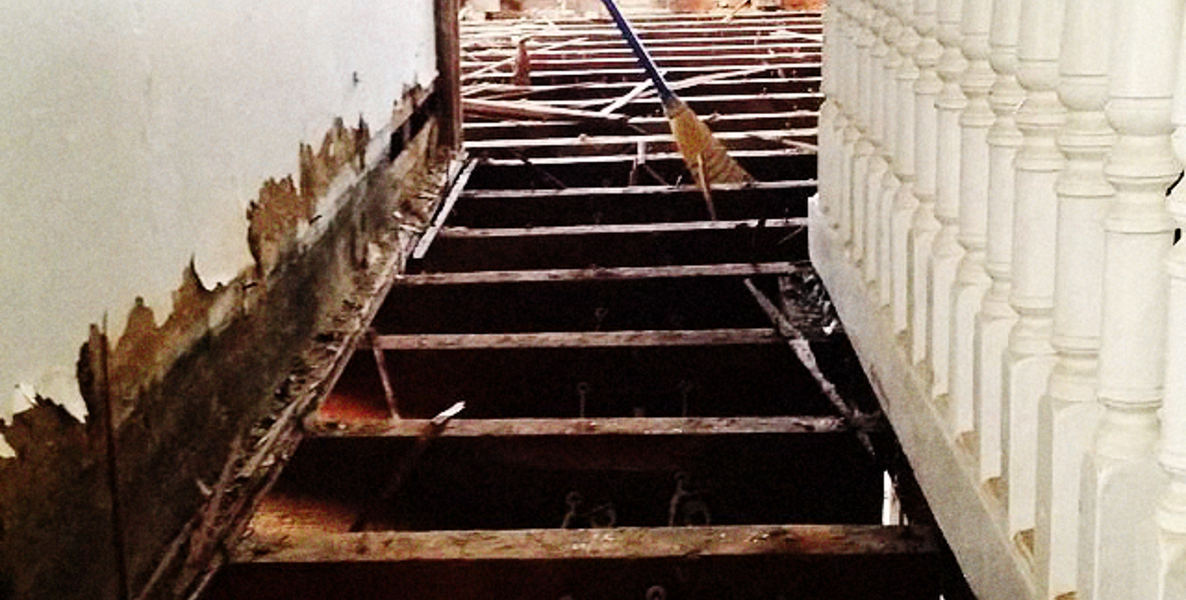When Hurricane Katrina hit the Gulf Coast in 2005, Gregory Trainor was a high school senior in North Jersey. On television, he watched the storm annihilate the coast of Louisiana and Mississippi, displacing more than a million residents from their homes by the time it was over. When he graduated from high school, he put off college, opting to head to New Orleans instead. He lived in a volunteer camp and spent his days gutting, demolishing, and rebuilding with scores of other disaster workers. Then he moved back to Philadelphia to go to Temple.
But something seemed eerily familiar.
“I looked around and realized that this is a disaster zone too,” Trainor says. “The only difference is, it’s a man-made disaster.”
Philadelphia has more than 40,000 vacant properties—combined they make an abandoned swath of land the size of Center City. These vacant properties suck $3.6 billion from property values per year, $20 million in costs to the city to maintain them, not to mention the $17 million a year in lost property taxes—money our schools desperately need.
“If 40,000 houses were destroyed overnight we’d receive millions in aid,” says Trainor. “But we got used to this because it happened over generations and threw up our hands. This is a huge problem that deserves the same level of response as Katrina. It’s not just a problem of houses sitting empty; it’s an everything problem.”

Trainor took his background in demolition-based disaster response and offered a new solution: Create an army of people willing to tear down these houses for something better than money—knowledge. Founded in 2014, Philadelphia Community Corps uses abandoned houses as 3D classrooms to teach underserved Philadelphians valuable construction and trade skills. As they “deconstruct” a property piece by piece, they learn how a house is put together, and salvage the materials for reuse.
The road to making PCC a reality was not a smooth one for Trainor. In 2009, while studying journalism at Temple, he read Buzz Bissinger’s book A Prayer for the City, which put into words—“abandoned housing crisis”—what he had been observing. He first tried to launch PCC in the fall of 2009 as a student organization at Temple that would do neighborhood cleanups, lot cleanups, block beautification projects, and installation of free benches and fences. But he says Temple was hesitant to get involved with an organization with an ultimate interest in tearing down North Philadelphia houses because of past criticisms that they were destroying the local neighborhoods around campus.
“If 40,000 houses were destroyed overnight we’d receive millions in aid,” says Trainor. “But we got used to this because it happened over generations and threw up our hands. This is a huge problem that deserves the same level of response as Katrina.”
Two years later, Trainor took a year off from Temple to try again at starting a nonprofit that would use the labor and commitment of citizens from underserved neighborhoods to battle the housing blight around them. But insurance costs for the participants and equipment and vehicles was astronomical, an insurmountable hurdle.
“We were thinking too big,” says Trainor. “We were trying to make it this huge neighborhood revitalization organization where we would come in and clear all the blighted houses out. We needed to think smaller.”
So in 2012, he put the project on the back burner for a while, went back to school for both business and nonprofit management, took a class at the Citizens Planning Institute, and snagged a job with a for-profit salvage company, Philadelphia Salvage, based in Mount Airy.
“Everybody thought I’d given up, but I’d just kind of gone back to the drawing board,” Trainor says. “I needed to do a lot more research. I didn’t know enough, about business, I couldn’t talk the talk.”
While in school, Trainor got the idea to power his vision with a job training program. This model creates work for underemployed citizens; provides a pool of more affordable labor because it is unskilled; and opens doors to grants and funding. “Job training is the magic word in the nonprofit world right now,” Trainor says.
After six months with Philadelphia Salvage, he asked them if on their next project they would let him and a crew of job trainees go in and do the salvage work instead of their usual paid workers. It was a win-win: His boss saved money, and Trainor gained experience, credibility, and the use of their insurance. Philadelphia Salvage agreed, handing over a contract to mine seven houses on the campus of LaSalle University for salvage.
To deconstruct a rowhome and salvage it for materials, rather than smash it down, takes a lot longer—two to three weeks—than standard demolition. But in addition to serving as a hands-on classroom, it provides seven times as many jobs. For that first job, Trainor partnered with Mural Arts Program’s ex-offender apprenticeship project, which teaches job skills to the recently incarcerated. Using the “last on, first off” principal, Trainor showed them how to start with the light fixtures, plumbing fixtures and drywall then work their way from top to bottom of the home.
“It’s like reverse engineering,” Trainor says. “The only way you can learn about something is taking it apart. That’s why it’s such a great entry level job-training opportunity.”
While there a number of well-funded job training programs in Philadelphia like Mural Arts, Power Corps PHL, and YouthBuild Philly—there aren’t a lot of construction and demolition job training sites with qualified teachers, where unskilled people can experience what it’s like on a job site, increase their skills, and meet real contractors who are hiring. At the end of that first six-week partnership with Mural Arts, Trainor got three out of 15 participants full-time jobs with places like roof gardening company Roof Meadows and selective demolition company Pantano & Sons—a pretty good success rate for first time workers.
Using the “last on, first off” principal, Trainor showed them how to start with the light fixtures, plumbing fixtures and drywall then work their way from top to bottom of the home. “It’s like reverse engineering,” Trainor says. “The only way you can learn about something is taking it apart. That’s why it’s such a great entry level job-training opportunity.”
“Once we had one project under our belts it really changed everything for us,” Trainor says.
In September of 2014, Trainor launched PCC as a deconstruction and salvage program powered by job trainees. He continued to partner with different for-profit salvage companies for the contracts and nonprofit job training programs for the labor until 2015.
In May 2015, Trainor secured a three-week, eight-job trainee partnership with Power Corps to deconstruct a YMCA building in Ardmore, their biggest job to date. At the end of it, Power Corps offered to place four students with Trainor from September 2015 to March 2016, as long as Trainor could keep securing projects. These were PCC’s first full time employees. Around this time, Trainor met a man with a 55,000 square foot warehouse in the Northeast standing empty that he agreed to lease to Trainor for his salvage. His vision was finally coming together.
“The world kept throwing up barriers and we kept having to pivot to get around them and change our model,” Trainor says. “But the one thing that never changed was the idea to revitalize neighborhoods through tackling the abandoned housing problem.”
Trainor, though, was still struggling to make ends meet. While working to get PCC off the ground, he was also working as a power washer, a landscaper, a bartender, an EMT, a bouncer, a delivery driver, a handyman, even a firefighter. Then Marty Molloy of YouthBuild, a school that works with youth who have aged out of high school without a degree, offered Trainor a job as a building instructor. At first Trainor refused—he had come too far to give up his company. But when he heard he could keep growing his vision, securing 30 students for PCC for the year and honing his expertise as a teacher, he accepted.
“Growing up at my grandma’s, something was always wrong with her house. I thought, maybe I can grow up and learn how to do that so I can fix her house and make a good living,” says Destiny Stevens-Wooten, 20, a YouthBuild trainee. “But I had no idea how I would learn. This is hands-on, it’s reality, it really helps me see how it’s all put together.” In addition to job skills, Stevens-Wooten says PCC has also helped give her confidence, experience on how to behave professionally in a workplace, and even a few important life skills. “I had just moved,” she says, “and my landlord was like, go buy blinds and get them installed, and I was like no, I got this. Let me just measure the walls…”
Since its official launch, PCC—which is now Trainor and two other full-time staff—has worked consistently, deconstructing and salvaging 10 houses, one bar, the Ronald McDonald House at 39th and Chestnut, a theater, and that YMCA. But their biggest and most complex project was the old West Philadelphia High School building.
“We were there for two months,” Trainor says. “We salvaged more than two hundred chalk boards and so much more.”
Also unlike standard demolition, PCC’s deconstruction method means they are able to salvage 90 percent of a building’s materials for reuse. PCC sells these recycled materials out of their warehouse at affordable rates to contractors and small business startups and DIYers who care about incorporating reclaimed materials. The money from these sales keeps the lights on in the PCC office and pays the salaries of the small staff needed to keep the program going.
“We want people to start diverting those materials to us,” the now-28 year-old Trainor says, “so we can make the exchange of recycled materials really common. We want to grow that industry and grow a really reliable and affordable supply of reclaimed materials.”
Developers who hire PCC rather than a standard demolition company also get a tax deduction because it’s a 501(c)(3), and they can deduct the value of the donations they make to PCC in the form of building materials. This, Trainor says, may eventually make PCC cheaper than standard demolition.
Now Trainor is thinking big again, recommitting to his original mission to tackle blight on a bigger scale, and seeking a board of directors. His agreement with Power Corps will likely be renewed for another six months this fall, and the partnership with Youth Build is ongoing. He hopes to expand these partnerships so that eventually PCC can offer job training to many different populations—out of work veterans, women coming out of the shelter system, and homeless folks.
“Our ideal client is the City of Philadelphia,” he says. “We want a 100 house a year contract. It’s gonna happen.”
Photo header: Philadelphia Community Corps






